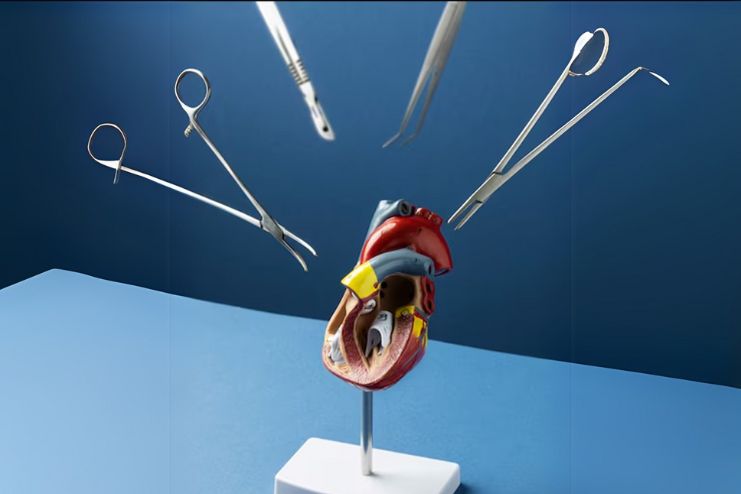AI Contribution
At HealthSpectra, we may use AI to refine grammar and structure, but every piece is shaped, checked, and approved by real people, our expert writers and editors, to ensure clarity, credibility, and care. Learn more..Affiliate Disclaimer
Some links in this article are affiliate links. We may earn a small commission if you make a purchase through these links, at no extra cost to you. We only recommend products we find useful to our readersDid you know 1 in every 5 deaths is caused by heart attack? Also, 1 person dies every 33 seconds due to heart disease in America. The U.S. has a higher rate of heart health risks and higher heart-issue-related deaths due to various factors. These include lifestyle habits, genetics, socio-economic factors, or even mental health issues.
The question remains: why are U.S. citizens facing such a deadly health challenge despite being part of a medically advanced country? In this article, let us understand the reasons behind this major health epidemic, heart health risks, and the leading cause of death, which has grappled the U.S. Understanding the factors is getting one step closer to solving the issue and preventing further loss of life.
Heart Disease Statistics in the U.S.
Heart disease or cardiovascular disease is a significant cause of death across the U.S. and is no longer a health issue but a significant public health crisis. Heart disease has claimed the lives of 702,880 people in the year 2022, making it the most important health challenge for Americans in the recent past. It is to be noted that over 120 million American adults suffer from a form of heart disease, with nearly half of the adults having at least one significant risk factor like hypertension or high cholesterol.
Despite the country being technologically advanced, the heart disease statistics in the USA point to a gap in health, education, as well as awareness. This has made many U.S. citizens vulnerable.
Major Risk Factors Behind Heart Disease

Heart health depends on various factors, such as lifestyle choices, genetics, family history, role of health care, social and financial conditions, and different underlying health reasons. Here are a few major risk factors behind heart disease:
Lifestyle Choices:
A combination of various unhealthy choices, including eating habits, physical inactivity, and smoking, are key contributors to heart disease. Indulging in high-sugar, unsaturated fats, and highly processed foods raises the risk of high cholesterol and blood pressure. A poor diet and unhealthy lifestyle choices can increase artery damage and plaque buildup. Despite this, it is alarming to know that more than 40% of Americans are classified as overweight or obese, further increasing their susceptibility to heart disease.
Genetics and Family History:
Other than lifestyle choices, genetics also play a vital role in heart disease. Persons with a family history of heart disease are prone to have the same diseases, particularly if combined with an unhealthy lifestyle. While you cannot change hereditary factors, you can better understand your family history to help guide early detection and intervention. This can potentially reduce risks.
Socioeconomic Factors and Healthcare Disparities:
It is observed that income disparities often face challenges in getting proper healthcare access. This can increase heart disease risks and deaths. Individuals with less income have limited access to preventive care, medications, and adequate health education, making them vulnerable. According to the CDC, healthcare disparities in low-income communities directly contribute to higher rates of cardiovascular issues.
The Role of Diet, Exercise, and Smoking in the Prevention of Heart Diseases

As mentioned earlier, lifestyle changes significantly impact heart health and the risk of heart disease. To prevent heart disease-related deaths, include heart-healthy foods in your diet, such as vegetables, fruits, lean proteins, and whole grains. These foods significantly reduce the risk of heart disease and related deaths.
Exercise regularly to lower blood pressure, regulate cholesterol levels, and help maintain weight. Habits like smoking or consuming alcohol also lead you to a greater risk of heart disease. Quitting smoking can help improve blood flow, reduce plaque buildup in arteries, and help maintain overall health.
Stress and Mental Health Impact on Heart Disease
Mental health has a significant impact on overall health. Depression and anxiety significantly increase heart disease risk. Chronic stress increases the risk of heart disease when coupled with increased inflammation, higher cholesterol levels, and poor mental health, eventually putting strain on the cardiovascular system. Prolonged stress can directly impact heart health through hormonal changes and physiological factors, leading to potential heart disease risks over time.
Key Points About Stress and Heart Disease:
Physiological Effects:
In chronic stress, the body releases stress hormones like cortisol and adrenaline, causing the heart rate to rise, blood pressure to increase, and constricting blood vessels. These actions put pressure on the heart in the long run.
Inflammation:
Chronic stress leads to inflammation in the body and plaque buildup in the arteries, which is a significant factor in coronary artery disease.
Unhealthy Behaviors:
Stress often leads to poor lifestyle choices like unhealthy eating, lack of exercise, and smoking, further increasing the risk of heart disease. Managing stress through mindfulness, therapy, and relaxation techniques can play a crucial role in preventing heart disease.
Emerging Treatments and Preventive Strategies

Lifestyle adjustments, including a healthy diet and exercise, are essential to preventing heart disease. However, advanced medical treatments such as minimally invasive procedures (angioplasty, stent placement), advanced heart imaging, genetic testing, and preventive medications like statins and blood pressure drugs also play a key role in early detection. These help through personalized treatments and reduce the risk of heart diseases and heart attacks.
Key Points About Emerging Treatments and Preventive Strategies for Heart Disease:
Minimally Invasive Procedures:
Modern treatment techniques, such as angioplasty and stent placement, have improved cardiovascular care. These techniques allow for quicker recovery times and less invasive treatment of blocked coronary arteries, making them a preferred option.
Genetic Testing:
Since family history plays a significant role in heart disease, it has become a common practice to analyze an individual’s genetic makeup and identify potential heart disease risk factors. These help medical practitioners make personalized plans and customize preventive strategies accordingly.
Advanced Heart Imaging:
Early detection and heart-related death prevention are possible through technologies like echocardiography and coronary CT angiography. These provide detailed images of the heart and detect abnormalities, if any, at the initial stage.
Preventive Medications:
Managing blood pressure and cholesterol levels is crucial to preventing heart disease and death. If taken consistently, preventive medications for both conditions help effectively manage heart health.
Conclusion
Heart disease is the leading cause of death in the U.S. There is an urgent need to address this public health crisis. It is alarming that despite medical advances and technological progress, heart diseases claim millions of lives every year. The preventable risks faced by Americans are genetics, lack of healthcare access, unhealthy lifestyles, smoking, and chronic stress. Add to this mental challenges and lack of proper knowledge on preventive medicines, and we know why this epidemic does not seem to end.
The best part about the above is that it is largely preventable. Small changes make a significant impact. Healthy habits, a balanced diet, and staying physically active are key to avoiding heart issues and untimely death related to heart problems. Heart disease tests and emerging treatments like minimally invasive procedures and stents play a crucial role in increasing longevity. We must ensure that the prevention of heart disease becomes a priority across communities and the system as a whole.
It is time to act and combat this situation head-on. This is the time to equip yourself with the proper knowledge and take charge of your life. We must work towards a world where heart disease no longer claims the lives of people. Remember to take care of your heart, and it will take care of you!
References
- https://pmc.ncbi.nlm.nih.gov/articles/PMC10460604/
- https://www.betterhealth.vic.gov.au/health/healthyliving/smoking-and-heart-disease
- https://www.sciencedirect.com/science/article/abs/pii/B9780128137048000243
- https://pmc.ncbi.nlm.nih.gov/articles/PMC11002715/
- https://www.cdc.gov/heart-disease/data-research/facts-stats/index.html
- https://www.cdc.gov/high-blood-pressure/data-research/facts-stats/index.html
In this Article





















